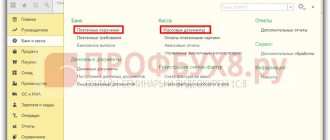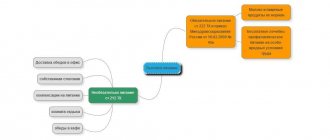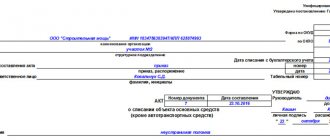Payment Methods
Payment methods for meals may vary.
Most often, the employer chooses the most acceptable option from the following: - pays monetary compensation (subsidy) for food; — organizes food delivery to the office (under agreement with the supplier); — provides free lunches in its own canteen; — pays for the services of cafes or canteens located on the territory of business centers. Typically, the employer participates in paying for meals on his own initiative, having fixed the corresponding condition in employment contracts or a collective agreement. However, sometimes the employer is required to pay for meals due to legal requirements.
The organization buys lunches for employees from a specialized organization
If the provision of free food to employees is provided for by an employment (collective) agreement, then the cost of food is part of the payment for their labor made in kind; in accounting, the cost of the provided free food is reflected in a manner similar to the calculation and payment of wages.
In accordance with the Chart of Accounts, account 70 “Settlements with personnel for wages” is intended to summarize information on settlements with employees of an organization for wages (for all types of wages, bonuses, benefits, pensions for working pensioners and other payments). The credit of account 70 reflects the amounts of wages due to employees in correspondence with the accounts of production costs (selling expenses) and other sources. The debit of account 70 “Settlements with personnel for wages” reflects the paid amounts of wages, bonuses, benefits, pensions, etc., as well as the amount of accrued taxes, payments under executive documents and other deductions. Analytical accounting for account 70 is maintained for each employee.
In accounting, the amount of accrued UST is an expense for ordinary activities (clause 5 of PBU 10/99). The accrual of the UST is reflected in the credit of account 69 “Calculations for social insurance and security” in correspondence with the debit of the production cost accounts.
Example 1
| 60 | 51 |
| 20 (23, 25, 26) | 70 |
| 70 | 60 |
| 20 (23, 25, 26) | 69 |
| 70 | 68 |
A different accounting procedure is provided if payment for meals is made on the basis of the Manager’s Order and is not provided for by an employment (collective) agreement.
For accounting purposes, the organization’s expenses for providing employees with free meals not provided for by the collective agreement are non-operating expenses in accordance with clause 12 of the Accounting Regulations “Organization Expenses” PBU 10/99, approved by Order of the Ministry of Finance of Russia dated May 6, 1999 No. 33n.
According to the Chart of Accounts, these expenses in this case are reflected in the debit of account 91 “Other income and expenses”, subaccount 91-2 “Other expenses”, in correspondence with the credit of account 60 “Settlements with suppliers and contractors”.
Considering that, according to paragraph 2 of paragraph 1 of Article 146 of the Tax Code of the Russian Federation, operations for the transfer of goods on the territory of the Russian Federation (performance of work, provision of services) for one’s own needs, expenses for which are not deductible when calculating corporate income tax, are recognized as an object taxation of VAT, the allocation of this tax for subsequent offset is necessary. Therefore, despite the non-commercial nature of the analyzed transactions, “input” VAT is allocated on account 19 and is subsequently subject to offset from the tax amounts transferred to the budget.
Payment for services provided by a public catering organization under a contract is reflected in the debit of account 60 “Settlements with suppliers and contractors” and the credit of account 51 “Settlement accounts”.
Expenses that form the accounting profit of the reporting period and are excluded from the calculation of the tax base for income tax for both the reporting period and subsequent reporting periods, in accordance with the Accounting Regulations “Accounting for income tax calculations” PBU 18/02, approved by Order of the Ministry of Finance Russia dated November 19, 2002 No. 114n, are recognized as a permanent difference (clause 4 of PBU 18/02).
According to clause 6 of PBU 18/02, permanent differences of the reporting period are reflected in accounting separately (in the analytical accounting of the corresponding account of assets and liabilities in the assessment of which the permanent difference arose), in this case in the analytical accounting of account 91, subaccount 91-2 .
The occurrence of a permanent difference leads to the formation of a permanent tax liability, which is the amount of tax that increases tax payments for income tax in the reporting period (clause 7 of PBU 18/02).
A permanent tax liability is defined as the product of a permanent difference that arose in the reporting period by the profit tax rate established by the legislation of the Russian Federation on taxes and fees and in force on the reporting date (24% according to paragraph 1 of Article 284 of the Tax Code of the Russian Federation).
According to clause 7 of PBU 18/02 and the Instructions for using the Chart of Accounts, permanent tax liabilities are reflected in accounting as the debit of account 99 “Profits and Losses” (for example, subaccount 99-2 “Permanent tax liability”) in correspondence with the credit of account 68 “ Calculations for taxes and fees."
Example 2
| Debit | Credit |
| 91-2 | 60 |
| 60 | 51 |
| 99-2 | 68 |
| 70 | 68 |
Paying for food on your own initiative
Personal income tax
When determining the tax base for personal income tax, all income of employees received both in cash and in kind must be taken into account (clause 1 of Article 210 of the Tax Code of the Russian Federation).
If employees are paid a cash subsidy for food, such payment is subject to personal income tax (Clause 1, Article 209 of the Tax Code of the Russian Federation). With other payment methods, the cost of free meals is income in kind, which is also subject to personal income tax (letter of the Ministry of Finance of Russia dated June 28, 2013 No. 03-04-06/24677).
However, in order to calculate personal income tax, it is necessary to establish the amount of income of each employee. Only in this case is tax charged on the amount of the subsidy (clause 8 of the information letter of the Presidium of the Supreme Arbitration Court of the Russian Federation dated June 21, 1999 No. 42). That is, for calculating personal income tax, the personalized accounting of each employee’s income is of decisive importance. If such accounting is organized (for example, when food stamps are issued to employees personally), then personal income tax must be charged on the cost of food.
If it is impossible to organize personalized accounting (for example, when purchasing drinking water, tea or coffee), then no income subject to personal income tax arises (letter of the Ministry of Finance of Russia dated January 30, 2013 No. 03-04-06/6-29).
A special situation is when food is organized on a buffet basis. The Ministry of Finance expressed the opinion that in this case, the income of employees can be determined by calculation: based on the total cost of food for employees and information from the working time sheet (letter of the Ministry of Finance of Russia dated April 18, 2012 No. 03-04-06/6-117). However, judges do not agree with this approach (resolution of the Federal Antimonopoly Service of the Far Eastern District dated June 15, 2009 No. F03-2484/2009).
Please note , the Ministry of Finance insists that the employer must take all possible measures to assess and record the income received by employees (letter of the Ministry of Finance of Russia dated 03/06/13 No. 03-04-06/6715).
Insurance premiums
When an employer pays employees monetary compensation (subsidies) for food, they must be charged pension, medical and injury contributions (Part 1, Article 7 of the Federal Law of July 24, 2009 No. 212-FZ, Clause 1, Article 20.1 of the Federal Law dated 07.24.98 No. 125-FZ, letter of the Ministry of Health and Social Development of Russia dated 05.19.10 No. 1239-19).
With other payment options, the determining factor for calculating contributions is the ability to determine the income of each employee. If the exact amount of income is known, then contributions must be added to the cost of food. Moreover, the accrual base should include the cost of the food provided, including VAT (Part 6, Article 8 of Law No. 212-FZ, Clause 3, Article 20.1 of Law No. 125-FZ).
If the amount of income cannot be determined (for example, with the “buffet” option), then insurance premiums are not charged for the cost of food. The bottom line is that only targeted payments in favor of specific employees are subject to contributions (letter of the Ministry of Labor of Russia dated May 24, 2013 No. 14-1-1061). This position is confirmed by the decision of the Supreme Arbitration Court, which stated: if it is impossible to determine the economic benefit of each employee, then insurance premiums are not charged (determined by the Supreme Arbitration Court of the Russian Federation dated 09.09.13 No. 11907/13).
How are insurance premiums assessed for food expenses?
The Ministry of Finance and the Federal Tax Service believe that the object of taxation with insurance premiums is any payments in favor of individuals that arise within the framework of labor relations and local regulations of a particular organization. Exceptions are made on the grounds listed in Art. 422 of the Tax Code of the Russian Federation.
That is, according to the regulatory tax authorities, the main criterion in determining the taxable base is the nature of the basis for payment as compensation for food. If such payment is based on
- Federal legislation
- Legislative acts of a constituent entity of the Russian Federation,
- Decisions of representative bodies of local self-government,
then these payments are not subject to the calculation of insurance premiums.
Accordingly, if payment to employees for food is made on the basis of a local act of the organization, then it is included in the taxable base (Letter of the Ministry of Finance dated 02/05/2018 No. 03-15-06/6579).
Mandatory payment for meals
If the employer participates in payment due to legal requirements, then the cost of food can be considered as compensation related to the performance of work duties.
For example, an employer must provide food and nutrition to employees who are employed in jobs with harmful and especially harmful working conditions (Article 222 of the Labor Code of the Russian Federation). If compensation is carried out within the established norms, then the following are not charged: - Personal income tax (clause 3 of article 217 of the Tax Code of the Russian Federation); — insurance premiums (clause 2, part 1, article 9 of Law No. 212-FZ, clause 2, part 1, article 20.2 of Law No. 125-FZ).
We note that harmful working conditions in workplaces must be confirmed by the results of a special assessment of working conditions (workplace certification) (see letter of the Ministry of Finance of Russia dated March 31, 2014 No. 03-03-RZ/13985). For information about when you need to conduct a special assessment, read the article “Special assessment of working conditions: select an “appraiser” and submit a declaration of conformity.”
Situation. In 2013, the company conducted workplace certification, which confirmed the presence of harmful conditions in the workplace. There was no special assessment of working conditions in 2014, but the company continues to provide free meals to workers.
Solution. The cost of free meals may not be subject to personal income tax or insurance premiums, since a previously conducted certification confirmed the presence of harmful working conditions. In this case, the provision of free food is mandatory due to legal requirements. It is possible to stop the free provision of food if two conditions are simultaneously met (clause 13 of the “Norms and Conditions”, approved by order of the Ministry of Health and Social Development of Russia dated February 16, 2009 No. 45n): - a special assessment confirmed safe (acceptable) working conditions; — the organization’s trade union (other representative body) does not object to the abolition of free meals. If a special assessment carried out in the future does not confirm the harmfulness, but the distribution of food continues, then personal income tax and contributions will already need to be calculated (since such distribution can no longer be considered as compensation).
Results
Providing meals to employees at the employer's expense may have several options. In order for food costs, which are not mandatory for the employer by law, to be taken into account in the profit base, food should be equated to labor costs by drawing up the necessary internal documents for this. As expenses related to wages, food will be subject to personal income tax and insurance contributions. VAT should be charged on the amount of food only if the food does not meet the salary criteria and is not mandatory for issue.
Sources:
- Labor Code of the Russian Federation
- Tax Code of the Russian Federation
- Letter of the Federal Tax Service of Russia dated October 31, 2014 N GD-4-3/ [email protected]
- Federal Law of July 24, 1998 N 125-FZ “On compulsory social insurance against industrial accidents and occupational diseases”
- Letter of the Ministry of Health and Social Development of the Russian Federation dated 05.08.2010 N 2519-19
- Letter of the Federal Social Insurance Fund of the Russian Federation dated November 17, 2011 N 14-03-11/08-13985
You can find more complete information on the topic in ConsultantPlus. Full and free access to the system for 2 days.
Personalization of data
The amounts transferred for food for employees are their income in kind and are subject to personal income tax (clause 1 of Article 210, clause 1 of clause 2 of Article 211 of the Tax Code of the Russian Federation).
And yet, in order to avoid claims from regulatory authorities, it is advisable to organize meals for employees in such a way that it is possible to determine the income received by each of them.
As for compensation and subsidies, these forms of payment for food are subject to personal income tax. The calculated amount of tax must be withheld directly from the employee’s income upon actual payment (Clause 4 of Article 226 of the Tax Code of the Russian Federation). In this case, the withheld tax amount cannot exceed 50% of the payment amount.
A dog, as you know, is a friend of man, but also a faithful and reliable guard. To protect their office from uninvited guests, the management of some companies makes a simple decision - to place a booth at the entrance and put a guard dog on a chain. And everything would be fine, but in order to avoid claims from regulatory authorities, pets will have to be kept according to the standards established by kennel clubs, depending on the breed of guard dogs (clause 4 of the letter of the State Tax Inspectorate for Moscow dated November 24, 1998 No. 11- 13/35186).
In accounting, the costs of maintaining dogs are taken into account in account 26 “General business expenses”. In tax accounting, it would be correct to classify such expenses as other expenses (clause 6, clause 1, article 264 of the Tax Code of the Russian Federation).
This is important to know: Benefits for corporate property tax
Compensation for food costs for employees
In addition to the above, consider the case when employees are simply compensated for the cost of food.
To summarize information on all types of settlements with employees of the organization, except for settlements for wages and settlements with accountable persons, the Chart of Accounts uses account 73 “Settlements with personnel for other transactions.” Payment of compensation from the cash desk is reflected in the debit of account 73 in correspondence with account 50 “Cash”.
To reflect non-operating expenses, the Instructions for using the Chart of Accounts provide account 91 “Other income and expenses”, subaccount 91-2 “Other expenses”.
Example 3
Let’s say that employees of Chaika LLC are compensated for the cost of lunch in the amount of 800 rubles. per month. The organization's accountant will make the following entries in accounting.
| Debit | Credit |
| 91-2 | 73 |
| 99-2 | 68 |
| 73 | 68 |
| 73 | 50 |
2) All inclusive
If set meals are provided by a catering organization (cafe, restaurant, canteen), the employing company must enter into an appropriate agreement with it. It must reflect the conditions for providing meals to employees of this company. An option is possible when employees come to lunch and present a pass, coupon or sign in a statement or a special journal.
This is important to know: Tax calculation for advance payment of property tax in 2020
As for the scheme of current accounting and control, forms of acts and other documents, the employer and the catering organization choose them independently, based on ease of use. Settlements between the parties are reflected in the general manner using account 60 “Settlements with suppliers and contractors”.
Choosing the optimal way to organize meals
When choosing a method for organizing meals for employees, important attention is paid not only to the organizational aspect, but also to the financial one. It’s no secret that “what’s cheap and tasty” is extremely rare. Therefore, to make the right decision, a comprehensive, objective assessment of the various methods of organizing nutrition is important.
Public catering services are understood as the result of enterprises’ activities to satisfy consumer needs for nutrition and leisure activities. These include, in particular, services for the production of culinary products, varied by day of the week, or special food rations for various groups of the population served (canteen food services), as well as for creating conditions for the sale and organization of their consumption at the enterprise (GOST R 50764 -95 “Catering services”).
When carrying out operations in public catering, you should be guided by the “Rules for the provision of public catering services”, approved by Decree of the Government of the Russian Federation of August 15, 1997 No. 1036.
The classification of public catering facilities is approved by the Decree of the State Standard of Russia dated 04/05/1995 No. 198 (GOST R 50762-95 “Public catering. Classification of enterprises”). In accordance with this classification, the main types of public catering facilities are:
- canteen - a public catering establishment that is open to the public or serves a specific group of consumers, producing and selling dishes in accordance with a menu varied by day of the week;
- bar - a catering establishment with a bar counter, selling mixed, strong alcoholic, low-alcohol and non-alcoholic drinks, snacks, desserts, pastry and bakery products, purchased goods;
- cafe is an enterprise that organizes food and recreation for consumers, providing a limited range of products compared to a restaurant. Sells branded, custom-made dishes, products and drinks.
The list of unified forms of primary accounting documentation for recording operations in public catering was approved by Resolution of the State Statistics Committee of Russia dated December 25, 1998 No. 132.
Currently, there are various forms of catering for employees, the main ones are:
- Organization of a catering facility.
- Order lunches for the office.
- Providing premises and equipment for cooking.
Firstly , when organizing meals for employees for a fee, the organization (individual entrepreneur) has an additional type of activity, which imposes additional requirements on both the taxation procedure and accounting.
It must be taken into account that in accordance with Chapter 26.3 of the Tax Code of the Russian Federation and the laws of the constituent entities of the Russian Federation in a number of regions, the implementation of activities related to the provision of public catering services has been transferred to the taxation system in the form of a single tax on imputed income. Article 346.27 of the Tax Code of the Russian Federation establishes that public catering services are understood as services for the production of culinary products and (or) confectionery products, the creation of conditions for the consumption and (or) sale of finished culinary products, confectionery products and (or) purchased goods, as well as for carrying out leisure
Chapter 26.3 of the Tax Code of the Russian Federation provides for the possibility of transferring to the taxation system in the form of a single tax on imputed income activities for the provision of public catering services carried out through public catering facilities with an area of the customer service hall of no more than 150 square meters for each public catering facility, and also not having visitor service halls.
Thus, when a taxation system is introduced in the region in the form of a single tax on imputed income in relation to the provision of public catering services, an organization (individual entrepreneur) is obliged to pay a single tax. Accordingly, the costs associated with the implementation of a new type of activity will need to be taken into account separately.
The Ministry of Finance of Russia in letters dated March 17, 2006. No. 03-11-04/3/141 and dated 06/07/2006 No. 03-11-04/3/283 clarifies that the application of the taxation system in the form of UTII in relation to the provision of public catering services does not depend on the amount of income, derived from the implementation of the specified type of activity, as well as from the status of the consumer, be it an employee of an organization or a “person on the street”. Thus, specialists from the Ministry of Finance of Russia made the following conclusion: “If an organization’s canteen provides food services to its employees for a fee, then this activity is subject to mandatory transfer to the payment of UTII.”
A single tax on imputed income must be paid regardless of the type of public catering facility. For example, the Federal Arbitration Court of the Volga-Vyatka District considered a dispute about the need to pay UTII when staffing a rotational camp with boiler stations to ensure normal working conditions (FAS Resolution of November 22, 2006 in case No. A29-2564/2006a). During the consideration of the case, it was established that the Company purchased food products that were subjected to heat treatment by a cook in boiler stations, i.e. temporary structures in the form of trailers equipped for cooking and eating food). Meals were provided by the employee for a fee (amounts for meals were withheld from the employees' wages). Based on the above, the courts came to the conclusion that “boiler stations are essentially a canteen, and the preparation of food and its sale is a food service. Consequently, this activity is subject to a single tax on imputed income and cannot be included in income tax expenses.”
Secondly , public catering facilities, such as canteens, bars, restaurants can be classified as facilities of service industries and farms, which requires the organization of separate accounting for income tax.
According to subclause 48 of clause 1 of Article 264 of the Tax Code of the Russian Federation, expenses associated with the maintenance of the premises of public catering facilities serving labor collectives (including the amount of accrued depreciation, costs of repairing premises, costs of lighting, heating, water supply, electricity supply, as well as fuel for cooking food) are taken into account as part of other expenses, if such expenses are not taken into account in accordance with Article 275.1 of the Tax Code of the Russian Federation.
Since January 1, 2006, the Tax Code of the Russian Federation has provided for the taxpayer’s obligation to maintain separate tax accounting for divisions carrying out activities related to the use of facilities of service industries and farms, from tax accounting for other types of activities. This article stipulates that service industries and farms include subsidiary farms, housing and communal services, social and cultural spheres, educational courses and other similar farms, production and services that sell services to both their employees and third parties.
The main feature of determining the tax base in accordance with Article 275.1 of the Tax Code of the Russian Federation is the possibility of accounting for losses for tax purposes resulting from the activities of service industries and farms only if a number of conditions are met:
- the cost of goods and services sold by the taxpayer corresponds to the cost of similar services provided by specialized organizations carrying out similar activities;
- the costs of maintaining service facilities and other similar facilities do not exceed the usual costs of servicing similar facilities;
- the conditions for the provision of services do not differ significantly from the conditions for the provision of services by specialized organizations for which this activity is the main activity.
At the same time, among specialists of the Ministry of Finance of Russia there is no consensus on the need to maintain separate accounting for a public catering facility located directly on the territory of the organization, and tax accounting for profits in the main type of activity of the organization.
For example, in the letter of the Ministry of Finance of Russia dated September 22, 2006 No. 03-03-04/1/669 it is explained that cafes and bars can be classified as objects recognized as service industries and farms, and, therefore, tax accounting for their activities must be kept separately.
At the same time, from the letter of the Ministry of Finance of Russia dated September 05, 2006 No. 03-03-04/1/652, it does not follow that it is necessary to maintain separate accounting for the costs of maintaining a canteen located on the territory of the organization and serving plant employees. In accordance with the specified letter, expenses associated with the maintenance of the premises of a public catering facility (canteen) are subject to inclusion in other expenses associated with production and sales.
According to the author, if the applicable sales prices for canteen (cafe, bar) products are generally close to the cost of production, and as a result of the activity, a loss on the activities of the specified service facility is not generated, then all costs associated with the maintenance of the catering facility, can be taken into account for tax purposes without any restrictions. As for tax accounting, it should be noted that the Tax Code of the Russian Federation does not provide for fines for violating the tax accounting procedure.
Until January 1, 2006, costs associated with the maintenance of public catering premises serving labor collectives were classified as other costs associated with production and sales. This approach is confirmed by the Resolution of the Federal Antimonopoly Service of the East Siberian District dated September 6, 2006 in case No. A74-1273/2006-F02-4571/06-S1.
Questions about the validity of accounting for tax purposes for the costs of maintaining public catering facilities have repeatedly been the subject of litigation. For example, the legality of accounting for expenses for depreciation of the canteen (Resolution of the Federal Antimonopoly Service of the Central District dated October 12, 2006 in case No. A09-15152/05-12), for the security of the canteen (Resolution of the Federal Antimonopoly Service of the Moscow District dated August 22, 2006 in case No. KA-A40/7640) was confirmed -06).
The daily distribution of free meals must be documented.
Currently, there is no unified form for this operation, so the organization can develop it itself and reflect it in the accounting policy, paying attention to the fact that the form contains all the mandatory details provided for in paragraph 2 of Art. 9 Federal Law dated December 6, 2011 N 402-FZ “On Accounting”.
Milk and other therapeutic and prophylactic food purchased for distribution to employees are accepted for accounting as part of inventories (debit to account 10 “Materials”) at the actual cost, equal to the amount of actual costs for its acquisition without VAT, and when issued it is written off to debit one of the accounts 20 “Main production” from the credit of account 10.
For all other employees in Art. 41 of the Labor Code of the Russian Federation establishes that a collective agreement may provide for the employer’s obligation to partially or fully pay for employees’ meals. To do this, in the section on wages, it is necessary to indicate that “the employer undertakes to provide employees with free lunches,” and in employment contracts it is necessary to provide a link to the corresponding clause of the collective agreement.
DANGEROUS COSTS OF "SIMPLIERS" (USN: INCOME - EXPENSES)
Employee meals, tax consequences - VAT
Experts from the Ministry of Finance and the Tax Service are in favor of the organization paying VAT to the budget on the cost of free meals for employees. They consider such food as a gratuitous transfer of goods to employees (Letter of the Ministry of Finance of the Russian Federation dated July 5, 2007 N 03-07-11/212, Article 146 of the Tax Code of the Russian Federation, Article 154 of the Tax Code of the Russian Federation). Another position, which taxpayers often adhere to, is that there is no need to charge VAT on the cost of free food, since it is organized within the framework of production activities in accordance with the requirements of an employment or collective agreement. Therefore, the provision of free or reduced-price meals to employees is not subject to VAT taxation (Resolution of the Federal Antimonopoly Service of the North-Western District dated September 26, 2005 N A44-1500/2005-15, Article 146 of the Tax Code of the Russian Federation). But we warn you that if you adhere to this position, you will have to come to terms with the fact that input VAT associated with the purchase of goods (work, services) for feeding workers cannot be deducted (Article 171 of the Tax Code of the Russian Federation) nor taken into account in expenses (Article 170 of the Tax Code of the Russian Federation). And, of course, you need to be prepared for a dispute with tax officials.








